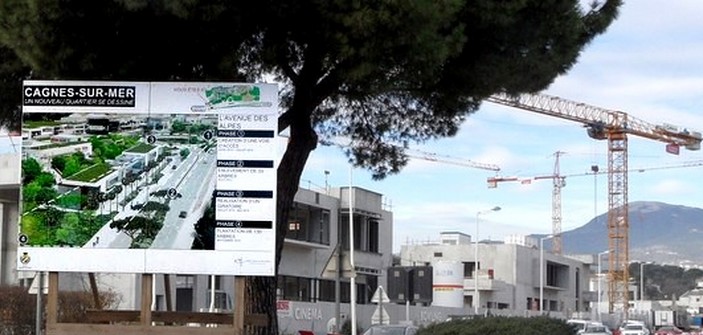It took 20 deaths during the terrible floods on the night of October 3 to 4 for the issue of urbanization and soil impermeability to finally be raised in the Mediterranean debate.
The grandiose inauguration of a new shopping center near a watercourse classified as a “red zone,” just three weeks after the tragedy, feels like an insult to the victims, their families, and all those affected by the disaster.
Indeed, the Polygone Riviera in Cagnes is located in a historically marshy area, next to the Malvan, a watercourse classified as “at risk” and in places a “red zone.” Yet, the announcement proudly heralds the opening of the first open-air shopping center in France, with 70,000 m² of retail space, 150 shops, 24 restaurants, 1 casino, 1 cinema, and 3,000 underground parking spaces; you know, the basement that was already flooded by the storms just three weeks ago…
Aside from the controversy over whether the Polygone was built in a flood-prone area, this inauguration raises numerous questions.
First, regarding safety: a flood-prone area, a risky watercourse, how can it be allowed today, in a place where it was once unthinkable to build, to authorize shopping centers attracting tens of thousands of visitors a day and residential constructions? If elected officials are sensitive to real estate pressures and the promise of numerous job creations, isn’t there state oversight, you know, those services made up of civil servants that are constantly being threatened with cuts and are eagerly thanked in the aftermath of severe weather events?
Secondly, regarding territorial planning: commercial areas are being built without proper transport solutions or traffic relief plans. Given the chronic traffic congestion on the Côte d’Azur and repeated pollution alerts, logic would dictate that such projects should not be authorized without accounting for the traffic influx they generate within a coherent departmental transport framework. This issue has evidently been deemed secondary, and after all, it’s only a matter of public health and the prevention of pollution-related pathologies. After all, we do build in agricultural areas while loudly proclaiming the desire for local organic produce for our school canteens…
On the commercial competition: we’re building against common sense and real commercial catchment areas, that is, based on the clientele likely to come and purchase specific types of products in specific locations. The Polygone in Cagnes-sur-Mer is emerging, we await Ikea in the Var plain and the Nice One shopping center behind Allianz Riviera, the commercial area of Cap 3000 is being doubled, a commercial area is being created at Nice SNCF station connecting the rails to Avenue Jean Médecin, a commercial zone is planned in Nice between the Raoul Mille library and the Provence railways station…
In the meantime, we know that in Nice, the TNL shopping center is not profitable if Carrefour leaves, and rumors suggest that the Nice Etoile shopping center is searching for renowned new brands to avoid going under. Meanwhile, local commerce is dying in the downtown areas along the coast, and no guarantees are provided on the type of jobs created in the new shopping centers. At the same time, we know that once a household has spent a few hundred euros at Nice One or Polygone, they won’t spend it in local businesses nearby.
Finally, regarding our mode of consumption: apart from a few novelties (Ikea, Printemps, Primark…), we are expected to see the proliferation of the same franchises, offering the same products. Who wants an 8th Eram or why not a 14th Célio in the Alpes-Maritimes? What about local commerce? Local products? Handicrafts? Has anyone considered a quota of cultural businesses per shopping area, to offer books, music, and artistic products in high-traffic zones? Has any thought been given to the types of products to offer, the mode of consumption, and ultimately, the kind of society we want?
As ordinary citizens, consumers, practitioners, or experts, we must ask these questions. We must also pose them to those who don’t ask them yet make the decisions. We must ask them to those who only ask such questions in the wake of tragedies, natural disasters, or economic crises… before it’s too late.
David Nakache


